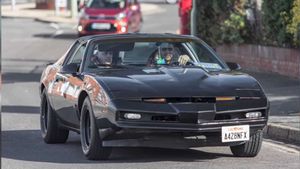Was this Rolls-Royce owned by the TV evangelist?
Barrett-Jackson has pulled a 1966 Rolls-Royce Phantom V limousine from its Scottsdale auction lineup amidst questions about its authenticity. This, of course, has sparked some controversy, although it’s nothing in scale to the Porsche Type 64 debacle at Monterey. Still, having a car like this pulled isn’t exactly an everyday occurrence.
The auction company does its own due diligence on all cars before they cross the auction block. Part of that process is consignors providing documentation of their vehicle as evidence of provenance. According to reports, the owner of this car provided a Rolls-Royce registry to Barrett-Jackson officials, and on that document Billy Graham was listed as the previous owner. On the occupation line was “evangelist.”

A sticking point came up when people who knew Graham personally saw the listing and had questions about the Rolls-Royce Phantom V’s authenticity. Then someone started doing some research, finding zero evidence that Graham ever owned any Rolls-Royce, let alone the one consigned for the auction.
Seen as the trappings of wealthy, something like this 1966 Rolls-Royce Phantom V certainly is the kind of car people would remember. Not only does it have that stately look which is unmistakable, the limousine comes loaded with luxurious appointments like supple leather upholstery, real wood trim throughout, and folding jump seats in front of the plush rear bench, like what can be found in many classic luxury cars. There’s also a 6.2-liter V8 under the long hood, making it a power vehicle in more ways that one.

In light of the lack of evidence the Phantom V was owned by Billy Graham, Barrett-Jackson wasn’t comfortable with leaving it on the docket. The consignor even offered to omit any mention of Graham and sell it not as a celebrity-owned vehicle, but the auction company declined, feeling even without any reference to Graham there was still a chance a buyer could have felt misled.
For other listings, Barrett-Jackson has done updates after due diligence, but this is an unusual case.
Source: USA Today




